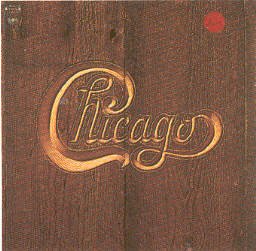|
|
 CHICAGO V CHICAGO V
Release Date: 1972
Cover Design: Wood Carving
Proves Cover Theory?: Yes
Becky Rating: X out of X
KING OF THE HILL, TOP OF THE HEAP
This is it, ladies and gentlemen, Chicago's greatest album. V is Chicago's Sergeant Pepper's Lonely Hearts Club Band, their Blonde on Blonde, their All Things Must Pass, their Exile on Main Street, their Who's Next, their American Beauty, their Band On The Run, their Part 3, their Boston, their The Joshua Tree, their The Southern Harmony and Musical Companion. It's the one Chicago album I'd take to a desert island. It's the one album I'd give to a space alien who had never heard Chicago and wanted to know what made Chicago great. There is not a single bad song on this album. There is not a single bad lyric on this album. There is not a single bad MOMENT on this album.
What makes it so great? First of all, the horns play their little hearts and lungs out. Every song features the horn section at its best - this, along with the Ballet for a Girl in Buchannon on II, is James Pankow's finest moment. Never again would he dominate an album like on V. Secondly, the lyrics. There isn't a single love ballad on this album - there are songs about life, songs about political issues, songs about the band's place in the music business, but no sappy love songs. Finally, the rhythm section is so on target - it's a testament to the depth of sound on this album that, the other day when listening to it, I was struck for the first time by Peter Cetera's bass playing. I'm not a drum aficionado, either, but the drums really stand out.
Normally, I try not to make these reviews a song-by-song recap, but this album is just so strong that I feel I have to tell you about all the songs. The album begins, like the previous three studio albums, with a song about the music business - Robert complains about the banality of today's music and asks for some innovation - maybe even a hit by a modern classical composer like Edgard Varese? (Varese, incidentally, was a major influence on Frank Zappa, with whom producer James William Guercio worked.) Each horn player takes a solo.
Next, there are two "breakup" songs, All Is Well and Now That You've Gone, both of which feature the horn section and Danny Seraphine's percussion prominently. All Is Well is in 6/4 time; Now That You've Gone is Pankow's best song that nobody knows about and that horn bridge (partially in 5/4 time) just GETS ME every time I hear it. (When Pankow was great, he was very very great..when he was bad...) I can even deal with Walt Parazaider's somewhat atonal solo at the end.
The famous Dialogues close out Side One; Terry Kath plays a political activist who gets into an argument with Peter Cetera's apathetic student. It's not so much a dialogue between two people as a dialogue between ardent pessimism and blind optimism, as each man voices the extreme view. The group then chimes in at the end stating their hopes of what they could do - make it happen, change the world, save the children - hey, in 1972, one of those children was me!
Three more "state of the world" songs follow - While the City Sleeps, a brass player's nightmare at the beginning, leads off Side 2. It always sounded like movie music to me - I don't know why. Then comes what has almost become Chicago's signature song, Saturday In The Park. You know this one. Lamm writes about a Fourth of July celebration, describing the ice cream man, a statue, the guitar player - it's almost as if you were there. He gets some "all is not lost" commentary in at the bridge. For those keeping score, the Italian words are nonsense. State of the Union is next, a rocking Cetera vocal about a fictional arrest for obscenity punctuated by some great horn soloing and bass playing. Did I mention how great the horns are on this album?
The final two songs turn inward, as Robert Lamm and Terry Kath examine where the band is after several years in the business. Goodbye is a very jazzy reflection of Robert Lamm's state of mind, using the familiar "trip" metaphor along with yet another odd time signature I can't figure out, and Lee Loughnane gets in a great trumpet solo.
Finally, Robert and Terry give us a gospel flavored mini-history of the band up to that point, disguised as a relationship lyric. Everyone else has gone home; the tired horns are reduced to playing simple chords; and the two friends sum up where they are and what they see for the future. They end by singing: "We must set brand new goals/We must not lose control/Of the possibility/Of finding the discovery/That would let everybody see/That we were just meant to be."
'Nuff said.
(c) 2001 Becky Banfield for Dos Gardenias Productions
Back to Chicago Album Review Index
Back to Chicago Homepage
Back to Music
Happy Cause I'm Going Home
|
|